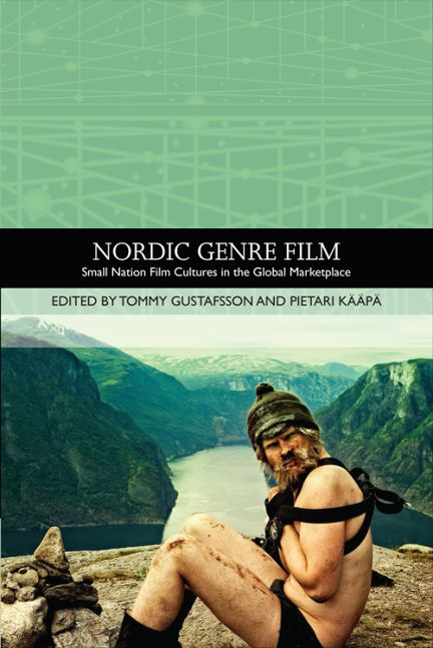Book contents
- Frontmatter
- Contents
- List of Illustrations
- List of Contributors
- Traditions in World Cinema
- Introduction: Nordic Genre Film and Institutional History
- PART I HERITAGE CINEMA AND NATIONAL NARRATIVES
- PART II CRIME AND DETECTIVE NARRATIVES
- PART III NORDIC OPTIMISM: ROAD MOVIES, COMEDIES AND MUSICALS
- PART IV NORDIC HORRORS
- 13 Slasher in the Snow: The Rise of the Low-Budget Nordic Horror Film
- 14 Nordic Vampires: Stories of Social Exclusion in Nordic Welfare States
- PART V GENRE BENDERS
- Index
14 - Nordic Vampires: Stories of Social Exclusion in Nordic Welfare States
from PART IV - NORDIC HORRORS
Published online by Cambridge University Press: 25 October 2017
- Frontmatter
- Contents
- List of Illustrations
- List of Contributors
- Traditions in World Cinema
- Introduction: Nordic Genre Film and Institutional History
- PART I HERITAGE CINEMA AND NATIONAL NARRATIVES
- PART II CRIME AND DETECTIVE NARRATIVES
- PART III NORDIC OPTIMISM: ROAD MOVIES, COMEDIES AND MUSICALS
- PART IV NORDIC HORRORS
- 13 Slasher in the Snow: The Rise of the Low-Budget Nordic Horror Film
- 14 Nordic Vampires: Stories of Social Exclusion in Nordic Welfare States
- PART V GENRE BENDERS
- Index
Summary
Nordic vampire films, comprising films produced in Denmark, Sweden and Finland, are not a coherent or regular phenomenon. Although they are familiar with and even borrow the conventions of Anglo-American vampire lore, their features often differ from the international horror mainstream in specifically Nordic ways. Rochelle Wright (2010: 56, 67) describes Nordic cases as being characterised by a fusion or hybridity of genres, including both the Anglo- American horror genre and Nordic socio-psychological drama, and argues that as a consequence, in Nordic vampire films the supernatural merges with realism. Internationally most vampires are social outcasts whose blood-desire and unnatural relationship with death mark them as evil, yet the Nordic vampires are not necessarily evil, but sympathetic characters whose social exclusion is often unrelated and prior to their vampirism (Wright 2010: 59).
In the Nordic films, and especially in recent Swedish films such as Anders Banke's Frostbite (Frostbiten, Sweden, 2006), Peter Pontikis's Not Like Others (Vampyrer, Sweden, 2008), Tomas Alfredson's Let the Right One In (Låt den rätta komma in, Sweden, 2008), and Josef Elias's Sun Shadows: Faithful Kiss (Sweden, 2011), vampires are excluded characters who have lost their right to social care. For example, the child vampire Eli in Let the Right One In, and the vampire sisters Vanja and Vera in Not Like Others, are detached from society and community, and they are deprived of the benefits of the Nordic welfare state – such as education and health care. Instead, they hide from others and avoid any social contact. For them, as for many other Nordic vampires, vampirism is a curse which causes them to mourn the lack of social cohesion and social support. In these films, the marginalisation leaves these characters no other choice but to turn against society by feeding on its members.
The Nordic welfare states, Sweden, Norway, Finland, Denmark and Iceland, are small countries with similar social structures; they have relatively high tax rates, as well as a strong emphasis on social cohesion, social responsibility and gender equality. Jon Kvist, Johan Fritzell, Bjorn Hvinden and Olli Kangas suggest that in the Nordic welfare state, wealth is constantly redistributed through taxes and benefits.
- Type
- Chapter
- Information
- Nordic Genre FilmSmall Nation Film Cultures in the Global Marketplace, pp. 203 - 214Publisher: Edinburgh University PressPrint publication year: 2015

